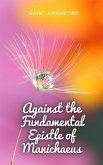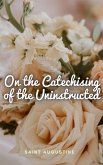"On the Morals of the Manichaeans" represents Saint Augustine's critical examination of the ethical teachings and practices of the Manichaean sect. In this insightful work, Augustine delves into the philosophical and theological underpinnings of Manichaean morality, offering a rigorous critique of its fundamental principles and ethical precepts.
With characteristic rigor and depth, Augustine scrutinizes the moral framework of Manichaeism, highlighting its contradictions, inconsistencies, and moral ambiguities. Drawing upon his extensive knowledge of Scripture, philosophy, and Christian theology, he exposes the deficiencies of Manichaean ethics and presents a compelling case for the superiority of Christian moral teachings.
Through a series of incisive arguments and logical analysis, Augustine challenges the moral relativism and dualistic worldview inherent in Manichaean doctrine. He articulates a vision of morality grounded in the principles of divine justice, human responsibility, and the pursuit of virtue, offering a compelling alternative to the ethical relativism of Manichaeism.
At once scholarly and polemical, "On the Morals of the Manichaeans" stands as a testament to Augustine's intellectual acumen and theological insight. It offers valuable insights into the ethical complexities of religious belief and the enduring struggle between competing moral worldviews. With its profound analysis and rigorous critique, this work continues to be studied and debated by scholars and theologians seeking to understand the nature of moral truth and the foundations of Christian ethics.
With characteristic rigor and depth, Augustine scrutinizes the moral framework of Manichaeism, highlighting its contradictions, inconsistencies, and moral ambiguities. Drawing upon his extensive knowledge of Scripture, philosophy, and Christian theology, he exposes the deficiencies of Manichaean ethics and presents a compelling case for the superiority of Christian moral teachings.
Through a series of incisive arguments and logical analysis, Augustine challenges the moral relativism and dualistic worldview inherent in Manichaean doctrine. He articulates a vision of morality grounded in the principles of divine justice, human responsibility, and the pursuit of virtue, offering a compelling alternative to the ethical relativism of Manichaeism.
At once scholarly and polemical, "On the Morals of the Manichaeans" stands as a testament to Augustine's intellectual acumen and theological insight. It offers valuable insights into the ethical complexities of religious belief and the enduring struggle between competing moral worldviews. With its profound analysis and rigorous critique, this work continues to be studied and debated by scholars and theologians seeking to understand the nature of moral truth and the foundations of Christian ethics.









